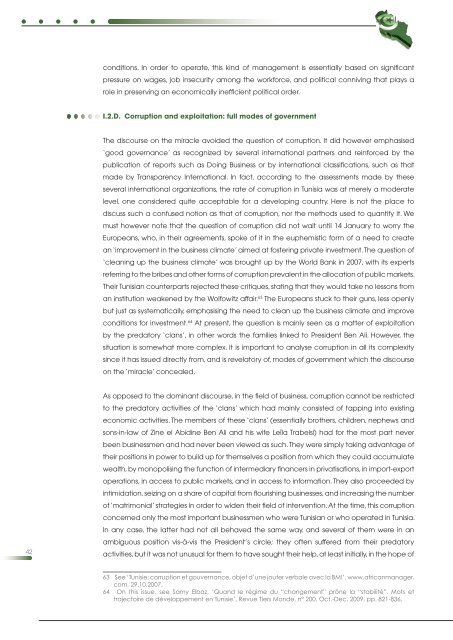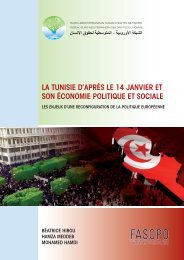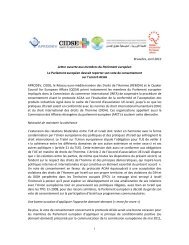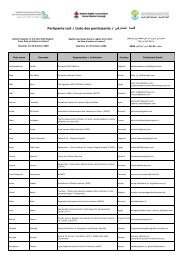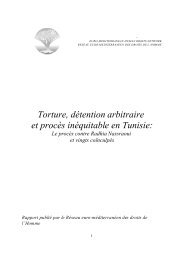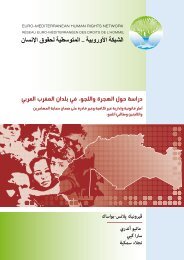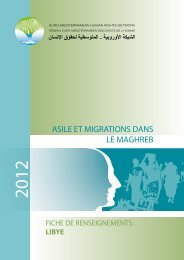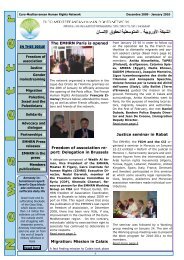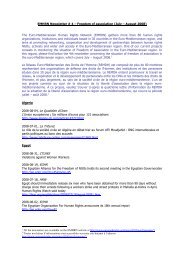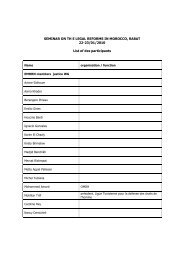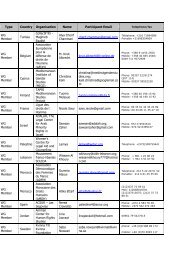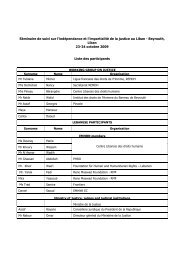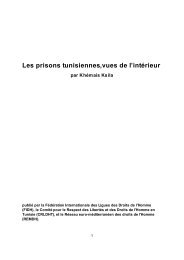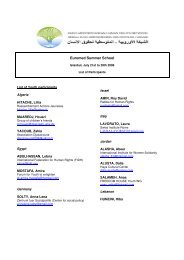tunisia after 14 january and its social and political economy - Refworld
tunisia after 14 january and its social and political economy - Refworld
tunisia after 14 january and its social and political economy - Refworld
You also want an ePaper? Increase the reach of your titles
YUMPU automatically turns print PDFs into web optimized ePapers that Google loves.
conditions. In order to operate, this kind of management is essentially based on significantpressure on wages, job insecurity among the workforce, <strong>and</strong> <strong>political</strong> conniving that plays arole in preserving an economically inefficient <strong>political</strong> order.I.2.D. Corruption <strong>and</strong> exploitation: full modes of governmentThe discourse on the miracle avoided the question of corruption. It did however emphasised‘good governance’ as recognized by several international partners <strong>and</strong> reinforced by thepublication of reports such as Doing Business or by international classifications, such as thatmade by Transparency International. In fact, according to the assessments made by theseseveral international organizations, the rate of corruption in Tunisia was at merely a moderatelevel, one considered quite acceptable for a developing country. Here is not the place todiscuss such a confused notion as that of corruption, nor the methods used to quantify it. Wemust however note that the question of corruption did not wait until <strong>14</strong> January to worry theEuropeans, who, in their agreements, spoke of it in the euphemistic form of a need to createan ‘improvement in the business climate’ aimed at fostering private investment. The question of‘cleaning up the business climate’ was brought up by the World Bank in 2007, with <strong>its</strong> expertsreferring to the bribes <strong>and</strong> other forms of corruption prevalent in the allocation of public markets.Their Tunisian counterparts rejected these critiques, stating that they would take no lessons froman institution weakened by the Wolfowitz affair. 63 The Europeans stuck to their guns, less openlybut just as systematically, emphasising the need to clean up the business climate <strong>and</strong> improveconditions for investment. 64 At present, the question is mainly seen as a matter of exploitationby the predatory ‘clans’, in other words the families linked to President Ben Ali. However, thesituation is somewhat more complex. It is important to analyse corruption in all <strong>its</strong> complexitysince it has issued directly from, <strong>and</strong> is revelatory of, modes of government which the discourseon the ‘miracle’ concealed.42As opposed to the dominant discourse, in the field of business, corruption cannot be restrictedto the predatory activities of the ‘clans’ which had mainly consisted of tapping into existingeconomic activities. The members of these ‘clans’ (essentially brothers, children, nephews <strong>and</strong>sons-in-law of Zine el Abidine Ben Ali <strong>and</strong> his wife Leïla Trabelsi) had for the most part neverbeen businessmen <strong>and</strong> had never been viewed as such. They were simply taking advantage oftheir positions in power to build up for themselves a position from which they could accumulatewealth, by monopolising the function of intermediary financers in privatisations, in import-exportoperations, in access to public markets, <strong>and</strong> in access to information. They also proceeded byintimidation, seizing on a share of capital from flourishing businesses, <strong>and</strong> increasing the numberof ‘matrimonial’ strategies in order to widen their field of intervention. At the time, this corruptionconcerned only the most important businessmen who were Tunisian or who operated in Tunisia.In any case, the latter had not all behaved the same way, <strong>and</strong> several of them were in anambiguous position vis-à-vis the President’s circle; they often suffered from their predatoryactivities, but it was not unusual for them to have sought their help, at least initially, in the hope of63 See ‘Tunisie: corruption et gouvernance, objet d’une jouter verbale avec la BM!’, www.africanmanager.com, 29.10.2007.64 On this issue, see Samy Elbaz, ‘Qu<strong>and</strong> le régime du “changement” prône la “stabilité”. Mots ettrajectoire de développement en Tunisie’, Revue Tiers Monde, n° 200, Oct.-Dec. 2009, pp. 821-836.


